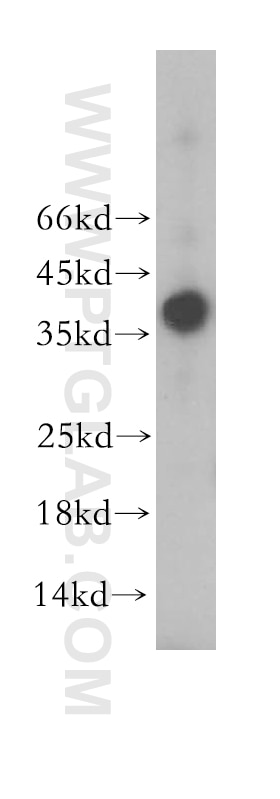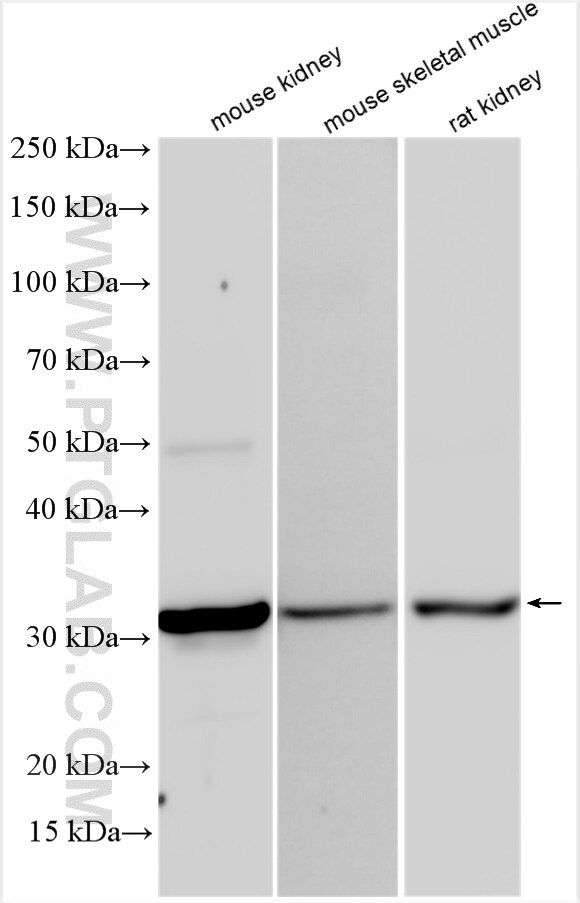PSCA Polyklonaler Antikörper
PSCA Polyklonal Antikörper für WB, ELISA
Wirt / Isotyp
Kaninchen / IgG
Getestete Reaktivität
human, Maus
Anwendung
WB, ELISA
Konjugation
Unkonjugiert
Kat-Nr. : 17171-1-AP
Synonyme
Geprüfte Anwendungen
| Erfolgreiche Detektion in WB | Mausnierengewebe, Maus-Skelettmuskelgewebe, PC-3-Zellen |
Empfohlene Verdünnung
| Anwendung | Verdünnung |
|---|---|
| Western Blot (WB) | WB : 1:500-1:2000 |
| It is recommended that this reagent should be titrated in each testing system to obtain optimal results. | |
| Sample-dependent, check data in validation data gallery | |
Veröffentlichte Anwendungen
| KD/KO | See 1 publications below |
| WB | See 3 publications below |
Produktinformation
17171-1-AP bindet in WB, ELISA PSCA und zeigt Reaktivität mit human, Maus
| Getestete Reaktivität | human, Maus |
| In Publikationen genannte Reaktivität | human, Maus |
| Wirt / Isotyp | Kaninchen / IgG |
| Klonalität | Polyklonal |
| Typ | Antikörper |
| Immunogen | PSCA fusion protein Ag10710 |
| Vollständiger Name | prostate stem cell antigen |
| Berechnetes Molekulargewicht | 123 aa, 13 kDa |
| Beobachtetes Molekulargewicht | 36 kDa |
| GenBank-Zugangsnummer | BC023582 |
| Gene symbol | PSCA |
| Gene ID (NCBI) | 8000 |
| Konjugation | Unkonjugiert |
| Form | Liquid |
| Reinigungsmethode | Antigen-Affinitätsreinigung |
| Lagerungspuffer | PBS with 0.02% sodium azide and 50% glycerol |
| Lagerungsbedingungen | Bei -20°C lagern. Nach dem Versand ein Jahr lang stabil Aliquotieren ist bei -20oC Lagerung nicht notwendig. 20ul Größen enthalten 0,1% BSA. |
Hintergrundinformationen
Prostate stem cell antigen (PSCA) is a protein composed of 123 amino acid residues. PSCA belongs to the LY-6/Thy-1 family of cell surface antigens. It is highly expressed in normal prostate and further up-regulated in prostate cancer, as well as non-prostatic malignancies including gastric cancer. PSCA plays a critical role in cell adhesion, proliferation, and survival. The obasrved MW of PSCA is between 36 to 40 kDa in paper (PMID: 11309275).
Protokolle
| PRODUKTSPEZIFISCHE PROTOKOLLE | |
|---|---|
| WB protocol for PSCA antibody 17171-1-AP | Protokoll herunterladen |
| STANDARD-PROTOKOLLE | |
|---|---|
| Klicken Sie hier, um unsere Standardprotokolle anzuzeigen |
Publikationen
| Species | Application | Title |
|---|---|---|
Endocrinology mTOR regulates mineralocorticoid receptor transcriptional activity by ULK1- dependent and independent mechanisms | ||
PLoS One Pan-cancer analysis of PSCA that is associated with immune infiltration and affects patient prognosis
| ||
J Immunother Cancer Impact of tumor localization on antitumor immunity with conditionally activated CTLA-4 blockade |



